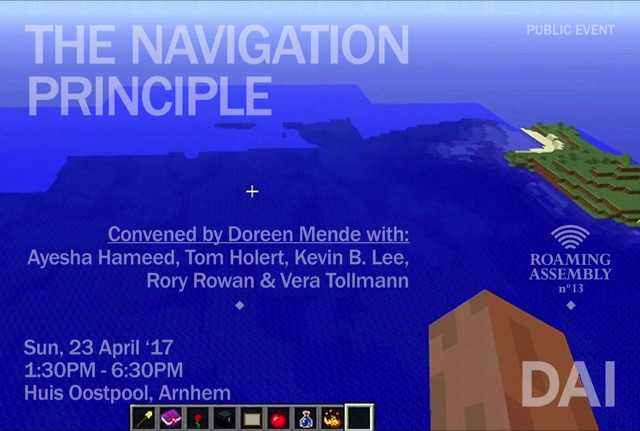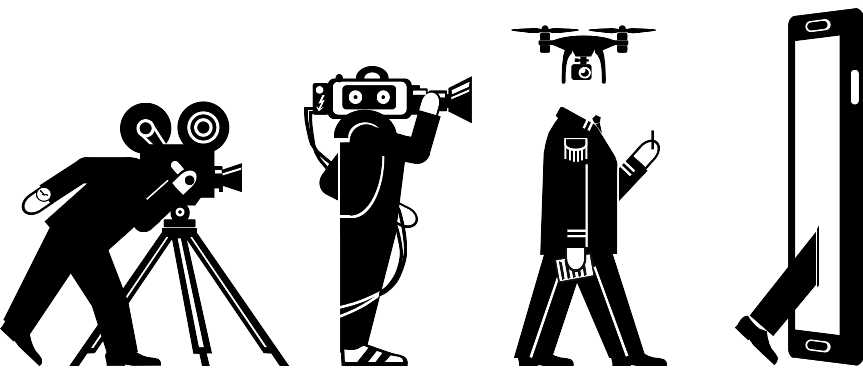2017 ~ Sunday April 23 in Arnhem: ROAMING ASSEMBLY#13 ~ THE NAVIGATION PRINCIPLE ~ convened by Doreen Mende
You are warmly invited to join us at our Planetary Campus in Arnhem on Sunday, April 23, 2017 for the brilliant and thought-provoking 13th (public, as always) edition of our Roaming Assembly, that combines thinking through the data logical condition of digitized matter with thinking with and from water:
The Navigation Principle
"Where does the world end?" asks the female voice in Harun Farocki's Parallel 2 (2014) while the subjective shot perspective directs the viewer on the continuous flight across a digitized blue matter with geometric islands popping up, and disappearing again. The sequence offers a horizon for our proposition to enter the Navigation Principle through a double dimension of what we might call, following hydro-feminist Astrida Neimanis, 'hydrologics'.
One dimension addresses the data logical condition of digitized matter. It takes us towards an investigation of a computer-generated image that operates through digital liquidity and algorithmic cultures.
A second, parallel dimension takes us towards the ancient art of navigation that is revisited as a mode of inhabiting the contemporary political condition. It opens the prospect of what it means to think with and from 'water'.This is a feminist concern that rethinks received understandings of planetarity and globalization.
How can we think the entanglement of this kind of 'double hydrologics'? What practices of articulation and inter-animation can be invented for the present and future?
How can we politicize that new image-regime which fosters the “industrialization of thought” (Farocki) through action, operation, and embodiment? What happens to the production of knowledge in the navigational landscape of 'double hydrologics'?
How and in what ways does 'navigation' offer a method, a practice, a politics, an aesthetics, an epistemology and an ontology?
The Navigation Principle was convened and will be introduced and moderated by
With:
Kevin B.Lee i.c.w. Marianna Maruyama & DAI-students
Roaming Assembly#13 takes place in conversation with the
Harun Farocki Institute in Berlin and the CCC Research Programme in Geneva.
Please note that on Saturday, April 22, DAI organizes a WORKSHOP WITH KEVIN B.LEE as well as A SEMINAR WITH AYESHA HAMEED & DOREEN MENDE in preparation, of the public event on Sunday. There are few places available for interested members of the public. You are welcome to contact Peter Sattler<peter@peterkristinn.com>
Program Sunday, April 23
(please scroll for practicalities)
13:30 Word of welcome by DAI-director Gabriëlle Schleijpen
13:35 -13.50 Doreen Mende: THE NAVIGATION PRINCIPLE: Notes on Double Hydro-logics
13.50-14.10 Tom Holert: After Montage?
In one of the last public lectures preceding his premature death in 2014, filmmaker, artist and writer Harun Farocki pondered the question
to what extent, in the age and realm of the digital image, the foremost visual methodology of political modernism, namely montage, has given way
to the paradigm of navigation. Already in Parallel I-IV, his inquiry of computer game visuality, Farocki had raised the issue of the epistemological and aesthetic consequences of such a shift. In his talk Tom Holert will attempt to continue this interrogation of the condition of contemporary digital visual cultures, mobilizing the notion of "navigation" to trace the terrain of operational image production and usage. Particularly interested in the fate of the idea of the political or dialectical image, this line of questioning aims at addressing the modes through which images are being converted into data spaces to be traveled as well as the instrumental life of images as tools of navigation (from neurosurgery to targeted killings).
14.10-14.30 Ayesha Hameed: Black Atlantis: The Plantationocene
To begin with, Black Atlantis is a long-term investigation. Its several iterations take the form of a live audio-visual essay that looks at possible afterlives of the Black Atlantic: in illegal migration at sea today, in oceanic environments, through Afrofuturistic dance floors and sound systems, and in outer space. Black Atlantis combines two discourses: Afrofuturism and the Anthropocene. As a point of departure, it explores Drexciya, the late twentieth-century electronic music duo from Detroit, and their creation of a sonic, fictional world. Through liner notes and track titles, they take the Black Atlantic below the water with their imaginary of an Atlantis comprised of former slaves who have adapted to living underwater. This wetness brings a sense of the haptic, the sensory, the bodily, and the epidermal back to the table. What this ‘below-the-water’ and Atlantis bring back are the bottom of the sea, the volume of the water, the materiality of the space of the ocean, and the other protagonists that inhabit it. This contribution for the Navigation Principle session will present the beginnings of the fourth chapter of the ongoing performance / live audio-visual essay Black Atlantis. We will be visiting the heartland of one of the three stops of the triangular trade, and taking seriously Donna Haraway’s and Anna Tsing’s use of the term ‘plantationocene’ which connects the development of a plantation form of production to the beginning of the current geological era that we are in.
14.30-15.20 COLLECTIVE THINKING
15.20-15.45 Coffee break
15.45:15.50 Doreen Mende: intro to the second part of THE NAVIGATION PRINCIPLE
15.50-16.10 Rory Rowan: Rethinking Geo-Politics in the Anthropocene - Notes on the Oceanic and the Computational
16.10-16.30 Kevin B Lee: Life Navigation
This talk will reflect on a work-session with DAI-students on April 22, 2017, where participants practiced methods of "life editing" and "life navigation" through personal technology, to reflect critically upon their own everyday practices of personal media production. Using "desktop documentary" and other innovative approaches, we learn to understand better and explore the nature of contemporary social media narrative and self-representation.
16.30-16.50 Vera Tollmann: The Disembodied View
Technoscientific image-regimes create a view that is disembodied from the human perspective. For example, the view from elsewhere in 'outer space' breaks with the standard partial perspective on mesoscale, a local position which seems habitual to human vision. How different is a picture taken by an astronaut in the International Space Station? Viewers have been trained in the objective view from above. How does machinic vision contribute to the construction of a 'disembodied view' and what does it mean for our relation to the image? When do we speak of embodiment and what do we mean with a universal view? Are formerly opposing concepts blending into hybrids? In her seminal essay "Situated Knowledges" from 1988, Donna Haraway reclaims the "sensory system" and critiques what she calls "the god trick of seeing everything from nowhere". Thinking with Haraway, is it possible to advocate for a universal view from below? And to update Haraway, can a contemporary feminist position succeed in transiting between scales? How could a critique of the Anthropocene concept get involved with humans on an embodied sense of self-scale?
16.50-17.40 COLLECTIVE THINKING
17.40-18.00 Doreen Mende: Closing Thoughts with the results from Kevin B.Lee's desktop work-session including the DAI-students and Marianna Maruyama
18.00-18.30 SCREENING of works by the artist, writer, and video essayist Ursula Biemann
18:30 Drinks for all - in the foyer at Huis Oostpool
Practical
*Sunday, April 23, 2017, from 13:30 till 18:30 followed by drinks
*Location: Huis Oostpool, Nieuwstraat 58, 6811 HX in Arnhem (at 5 minutes walking distance from the DAI's premises in the Kortestraat and 10 minutes from Arnhem's central train station).
*Free admission to all, no reservations needed for the symposium, but we'll appreciate it if you can join (and share) the event on facebook!
*After the event, around 18:30, a communal dinner (prepared by our amazing vegan chef Mari Pitkänen and her team) will be served at Huis Oostpool.
If you wish to join us for this dinner you will need to make a reservation. Please contact Peter Sattler<peter@peterkristinn.com> (closing date April 21). Costs for members of the public: € 10 for food & wine.
DAI's ROAMING ASSEMBLY
is a recurring public symposium scheduled to take place once a month, functioning as it were as the DAI-week's 'centerfold' event. This state-of-the-art speculative and hybrid program explores specific themes and topics of contemporary relevance to the thinking of art in the world today. It is considered a key part of the DAI's (version of the) Planetary Campus - an 'affective community' (Leela Gandhi) where caring for the earth goes along with the generous sharing of art and research, where complexity can be embraced and intellectual intra-actions are fostered, aiming to endow our praxes, wherever they are operational.
Although closely interlinked with the DAI's academic program, Roaming Assembly editions are not conceived as plain extensions of the regular DAI classes and seminars, but rather envisioned as sovereign happenings, designed to mobilize our bodies, our intelligences.
Curator-in-chief & framework Roaming Assembly: Gabriëlle Schleijpen
Co-ordination Roaming Assembly: Peter Sattler
Documentation: Silvia Ulloa; see our VIDEO ARCHIVE
If you want to receive our DAI-BULLETIN on a monthly base you are welcome to register here
DAI wishes to thank Toneelgroep Oostpool for its collegial hospitality.



